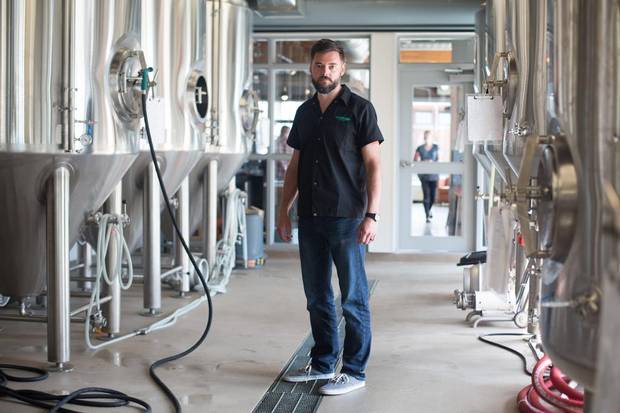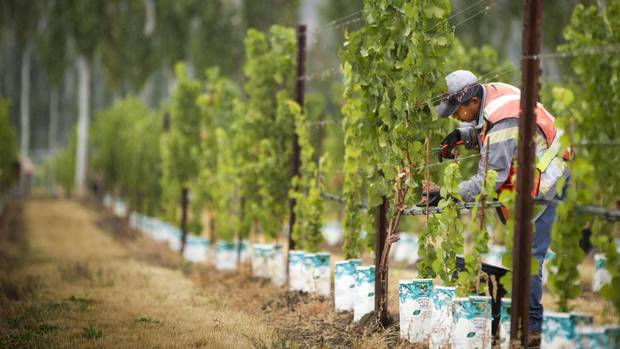Kegs filled with hoppy beer or the crowd favourite, an oolong mango tea ale, only have to roll a few metres from the stainless steel vats on the floor of Edmonton's Situation Brewing to the taps in the adjoining pub, but first the suds need to be virtually sold to the Alberta government's liquor commission and bought again by the bar at a different price.
And if Situation Brewing founder Wayne Sheridan wants to throw a keg over his shoulder and walk it across the street to a local restaurant, he can't collect any money for the sale. A cheque first needs to be made out to Alberta's government. Only after the province deducts its taxes can Mr. Sheridan make a claim to the Alberta Gaming and Liquor Commission to get paid.
"It's a triangle relationship. I guess it isn't that strange; we can live with it," he says with a smile.
Alberta has Canada's only fully privatized liquor system. But in a country where regulations surrounding the sale of alcohol are many and often maddeningly complex, this one quirk of Alberta's system is a minor inconvenience compared with the barriers faced in British Columbia and most other provinces.
The way Canadians purchase alcohol is regulated by production minimums, liquor markups, transportation requirements, warehousing fees and stocking standards, to name just a few rules.

Wayne Sheridan, owner of Situation Brewery in Edmonton.
Amber Bracken/for The Globe and Mail
The regulations vary from province to province, but after decades of gathering red tape or slowly deregulating, the entire system may soon be in for its biggest change since Prohibition.
On July 22, at their summer conference in Whitehorse, Canada's premiers reached a deal to strike a Canadian free-trade agreement. While much in the pact has yet to be negotiated, the agreement in principle would open the entire Canadian economy to free trade between provinces.
There are exemptions to the deal and one of the areas not covered will be alcohol. Instead, the premiers announced plans to strike a working group to explore ways to improve the trade in alcohol.
While the provinces of Ontario, British Columbia and Quebec walked away from the three-day summit with an agreement to allow online sales of wine among the provinces, larger reform of the Canada-wide system awaits a constitutional appeal in New Brunswick.
The New Brunswick government is appealing a decision from earlier this year that threw out the province's limits on importing alcohol from other provinces. The case was brought about by a man charged with bringing 14 cases of beer and three bottles of alcohol into the province from Quebec.
With a thriving wine industry, British Columbia has been one of the provinces pushing hardest to pull down trade barriers around alcohol. John Yap, the province's parliamentary secretary for liquor reform, says it started with a first ministers' meeting a few years ago during which Premier Christy Clark brought a case of B.C. wine to give to Ontario Premier Kathleen Wynne.
"The story is she said, 'Here you go, Premier Wynne. Consider this a special delivery because if you went into a store in Ontario to buy this, you wouldn't be able to get it.' Premier Wynne was surprised. I think that got the ball rolling to lower the barrier between provinces on wine," Mr. Yap said.

A worker picks gewérztraminer grapes at the Hidden Terrace vineyard in Okanagan falls.
JOHN LEHMANN/The Globe and Mail
British Columbia has also started to remove local rules that made the province's alcohol sector less efficient. For example, the province removed a regulation that required a lounge area in a restaurant to look materially different from the main seating area.
Mr. Yap said he's currently working on removing a rule that stops hotel guests from bringing to their rooms a glass of wine they receive as a welcome during check-in.
Provinces across Canada are doing away with some of the rules surrounding alcohol, while Saskatchewan is taking cues from its neighbour to the west and allowing more private competition in its market.
For generations, onerous alcohol regulations have resulted from morality issues linked with combatting alcoholism and impaired driving. "It explains why our treatment of alcohol is so different from shoes or softwood lumber," said James Brander, an economics professor at the Sauder School of Business at the University of British Columbia.
However, many governments now see the sector as a job creator and source of much-needed tax revenue. British Columbia, the birthplace of Canada's craft beer industry, lists microbreweries on a short list of potential job creators in the province, alongside movie productions, apparel and financial services.
Alberta has made craft beers a main plank of Premier Rachel Notley's jobs plan as the province looks to climb out of its longest recession since the Second World War. In the past month, the government replaced a previously tiered system of alcohol taxes with a single $1.25-a-litre levy and has pledged $20-million in annual grants to help the province's nascent microbrewery sector.
Mr. Sheridan's brewery is only possible because of a number of changes in Alberta's liquor laws over the past three years. Prior to 2014, the province required a small brewery to produce at least 500,000 litres annually. Mr. Sheridan's brewery will produce half of the old minimum. He says his brewery is one of the first to open in Edmonton under Alberta's new production laws.
"My background is home brewing, so that sounds like a hell of a lot for me, but by industry standards it's quite small," he said.
An electrical engineer who dabbled in home brewing for years, he says he saw an opening to start his own brewery when Alberta announced it was dropping the minimum production requirement. He now employs nearly 50 people.
The number of small breweries doubled in Alberta between 2014 and 2016. With 38 breweries in the province now, it's expected to double again by 2018.
While Terry Rock, executive director of the Alberta Small Brewers Association, says the pace of growth is exciting, British Columbia still has about 2-½ times more breweries than Alberta.
But he notes the small size of the sector is also the result of an uneven playing field between Alberta and most of Canada's provinces.
When a domestic or out-of-province producer wants to sell a beer, wine or spirit in Alberta, it has to fill out a two-page form, pay a $75 fee and then find someone in the province to sell its product. In comparison, an Alberta upstart looking to sell its product in the B.C. and Saskatchewan markets has to apply to each province's liquor control board and undergo a battery of questions covering everything from the quality of the packaging to the market demand for the product.
Kegs at Situation Brewery in Edmonton.
Amber Bracken/for The Globe and Mail
Each province also has a taste test where government employees pass judgment on the merit of the product.
"All our competitors had an aggressive targeting of Alberta in their business plans; it's a common strategy. There are craft brewing conferences in the U.S. with sessions dedicated to Alberta, because it's the easiest Canadian market to get in," Mr. Rock says.
"When you brew in B.C., your market is B.C. and Alberta. It's the same for most provinces. But when you brew in Alberta, your only market is Alberta. It doesn't make a lot of sense for Albertans," he added.
Saskatchewan's liquor system is changing. Forty of the province's 75 government stores are being sold to the private sector and 12 new private stores are opening.
The province currently has 185 private franchisees, primarily in small communities without a government-run store.
Over the past fiscal year, the province's government stores sold more than 2,700 types of products. Private stores can order different products, and they brought in more than 3,000 through the province's special-order process last year.
By comparison, Alberta's nearly 2,100 private liquor stores sold about 23,000 different products last year – the most of any Canadian province.
"There's a focus on modernizing the regulations and reducing red tape," said David Morris, a spokesman for the Saskatchewan Liquor and Gaming Authority.
Private stores have opened in Regina and Saskatoon, and Saskatchewan is doing away with rules that have bedevilled rural consumer for years. All store hours will now be the same across the province, all products will be available at all stores, and they'll be available at the same prices.
Previously, small, rural private locations were forbidden from carrying mass market beer – a Molson Canadian was out of the question, but a more expensive Heineken was available.
Trade fights between provinces will continue to arise as long as trade barriers and differing laws remain.
On Friday, Mr. Yap took aim at a new Alberta grant for local craft brewers, saying it was discriminatory because it supports local industry to the detriment of B.C. brewers. Facing similar charges from Saskatchewan, Alberta's leaders have said it is hypocritical for provinces that keep Albertan suds out of their markets by denying them access to government stores to then call foul over a grant.